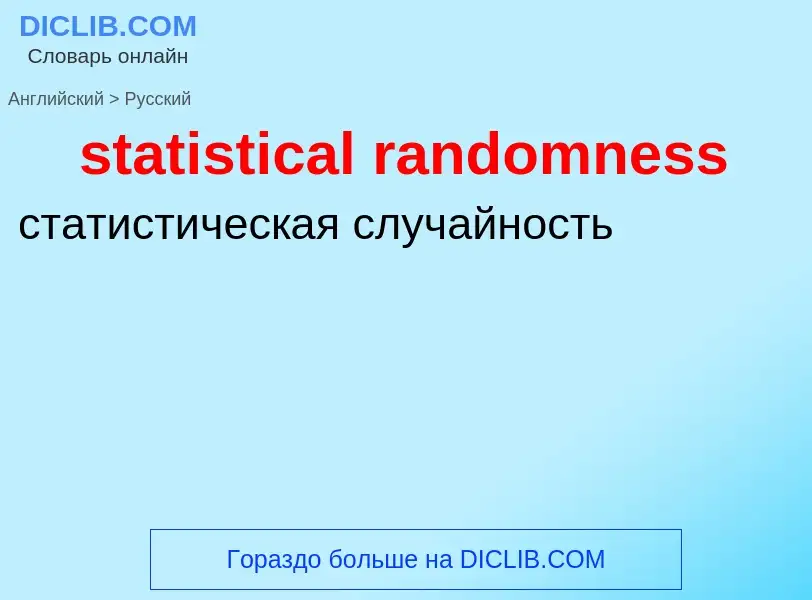Translation and analysis of words by artificial intelligence
On this page you can get a detailed analysis of a word or phrase, produced by the best artificial intelligence technology to date:
- how the word is used
- frequency of use
- it is used more often in oral or written speech
- word translation options
- usage examples (several phrases with translation)
- etymology
statistical randomness - translation to russian
математика
статистическая совокупность
статистический ансамбль
Definition
Wikipedia
A numeric sequence is said to be statistically random when it contains no recognizable patterns or regularities; sequences such as the results of an ideal dice roll or the digits of π exhibit statistical randomness.
Statistical randomness does not necessarily imply "true" randomness, i.e., objective unpredictability. Pseudorandomness is sufficient for many uses, such as statistics, hence the name statistical randomness.
Global randomness and local randomness are different. Most philosophical conceptions of randomness are global—because they are based on the idea that "in the long run" a sequence looks truly random, even if certain sub-sequences would not look random. In a "truly" random sequence of numbers of sufficient length, for example, it is probable there would be long sequences of nothing but repeating numbers, though on the whole the sequence might be random. Local randomness refers to the idea that there can be minimum sequence lengths in which random distributions are approximated. Long stretches of the same numbers, even those generated by "truly" random processes, would diminish the "local randomness" of a sample (it might only be locally random for sequences of 10,000 numbers; taking sequences of less than 1,000 might not appear random at all, for example).
A sequence exhibiting a pattern is not thereby proved not statistically random. According to principles of Ramsey theory, sufficiently large objects must necessarily contain a given substructure ("complete disorder is impossible").
Legislation concerning gambling imposes certain standards of statistical randomness to slot machines.

![classical]] systems in [[phase space]] (top). Each system consists of one massive particle in a one-dimensional [[potential well]] (red curve, lower figure). The initially compact ensemble becomes swirled up over time. classical]] systems in [[phase space]] (top). Each system consists of one massive particle in a one-dimensional [[potential well]] (red curve, lower figure). The initially compact ensemble becomes swirled up over time.](https://commons.wikimedia.org/wiki/Special:FilePath/Hamiltonian flow classical.gif?width=200)
![Visual representation of five statistical ensembles (from left to right): [[microcanonical ensemble]], [[canonical ensemble]], [[grand canonical ensemble]], [[isobaric-isothermal ensemble]], [[isoenthalpic-isobaric ensemble]] Visual representation of five statistical ensembles (from left to right): [[microcanonical ensemble]], [[canonical ensemble]], [[grand canonical ensemble]], [[isobaric-isothermal ensemble]], [[isoenthalpic-isobaric ensemble]]](https://commons.wikimedia.org/wiki/Special:FilePath/Statistical Ensembles.png?width=200)
